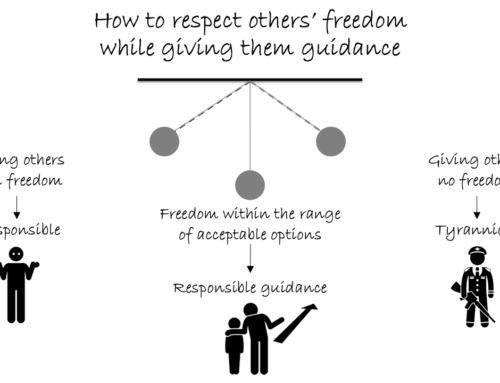When we cultivate tolerance, we accept others’ right to beliefs and behaviors different from ours. By such tolerance, we harmonize with the way God has made us all, in providing us free will.
As the world’s various sacred texts demonstrate, though God guides everyone to use their free will wisely, he never overrules their free will. This is demonstrated in the Bhagavad-gita’s conclusion (18.63), wherein the speaker Krishna, who is God descended on the earth, respects human independence and appeals to human intelligence — and steers far clear of imposing his will on human will. When God himself respects others’ free will, who are we to not respect it?
When we tolerate others’ beliefs, that doesn’t mean we embrace philosophical relativism, which denies the very possibility of objective truth in the domain of spirituality. Just because we accept that people have a right to different beliefs doesn’t mean that we have to accept that all those different beliefs are right. Based on our tradition’s teachings, we may discern that different beliefs have different degrees of alignment with truth: some beliefs may be highly aligned and some, highly misaligned.
Similarly, when we tolerate the various behaviors that may arise from different beliefs, that doesn’t mean we tolerate any and every behavior, including especially intolerant behavior. One such behavior that can’t and shouldn’t be tolerated is intolerance in action. Suppose someone holds on to the intolerant belief that all those whose beliefs differ from theirs are not just wrong or stupid but also evil. Their belief is their private matter, but when they translate that belief into action by terrorizing, persecuting or eradicating others, then they need to be firmly stopped. Tolerance that doesn’t stand up to intolerance reduces itself to impotence.
One-sentence summary:
Tolerance implies accepting others’ right to have different beliefs; it doesn’t mean accepting that their different beliefs are right — or accepting that their beliefs give them the right to behave intolerantly.
Think it over:
- How does tolerance harmonize us with the way God has made us?
- What does tolerance not imply in the domain of beliefs?
- What does tolerance not imply in the domain of behaviors?
***
18.63: Thus I have explained to you knowledge still more confidential. Deliberate on this fully, and then do what you wish to do.
To know more about this verse, please click on the image



Leave A Comment